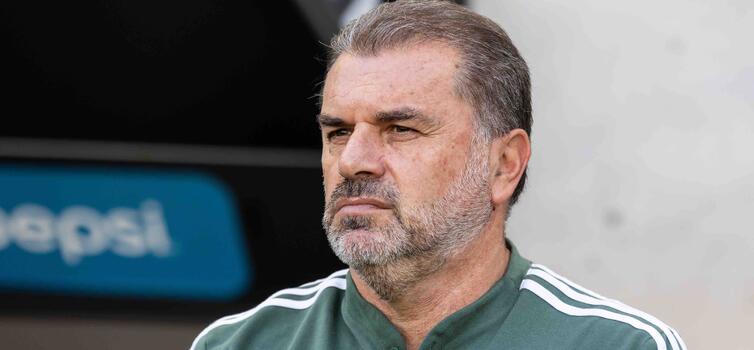Dier v Postecoglou and what constitutes tactical training?

Ange Postecoglou: 'I would probably say we don't do anything apart from tactical work'
Written by Simon Austin — April 17, 2024
Tottenham manager Ange Postecoglou has responded to Eric Dier’s assertion that he “really doesn't do any tactical work” in training.
Dier, 30, initially joined Bayern on loan in January to the end of the season, before the Bundesliga club made the move permanent in March. Appearing on The Overlap last week, Dier was asked about Postecoglou’s training methods.
He said: “Interestingly, he really doesn't do any tactical work (in training). What he does is, every single training drill from Monday to Friday is drawn up to represent the way that he wants to play.
"[Antonio] Conte, I could do it blind, but that was a lot of tactical work Monday to Friday, a lot of 10 versus zero, walk-throughs. You were so well drilled, it would be engrained in you."
"YOU BEST ASK ERIC... WE DON'T DO ANYTHING BUT TACTICAL WORK!" Ange on Dier's Comments About Tactics.
— Chris Cowlin (@ChrisCowlin) April 12, 2024
Embargoed press conference: https://t.co/qMD6updrc5#coys #thfc #Tottenham #Spurs pic.twitter.com/e570gemOwg
Postecoglou has now responded, saying: "It's probably something you'd have to ask Eric, I don't know what you mean by tactical work. Everything we do is geared on how we are going to play our football, so for me by extension is tactical work.
"Whether that's on us, or whether it's on the opposition. In fact I would probably say we don't do anything apart from tactical work. That's all we do every day. If we're working on our fitness, we're still trying to play our football.
"But I haven't seen the interview so I'm not sure what he's referencing.
"If you're talking about do we do training where we're standing around and working on how we're going to stop an opposition, how we're going to break down? No, we don't do that.
"But I don't think that's the only kind of tactical work that exists. I think anyone who trains with us will tell you that all we do is train the way we play. Maybe that's not tactical work, I don't know.”
WHAT CONSTITUTES TACTICAL WORK?
This raises interesting questions about what constitutes tactics and tactical work - and about the contrasting playing and training philosophies of different managers. First of all, Postecoglou’s game model is very different to that of Conte or Jose Mourinho, who Dier previously played under at Tottenham.
Whereas the latter duo generally prefer their teams to quickly retreat into shape when they lose the ball and then counter-attack, Postecoglou plays a possession-based style and wants his players to press aggressively to regain.
In a webinar with Hudl, when he was manager of Yokohama in the J-League, Postecoglou outlined his playing philosophy. He said: “Certain things are non-negotiables and the first one is I want my teams to have the ball.
“Our defensive work doesn’t stray from our core belief - we are a team that want to have the ball. As a coach, when I’m watching the game, I’m just not comfortable when the opposition have the ball. Our whole defensive set-up is, 'Let’s get the ball back off them as quickly as possible.’”
The second point is about how different coaches deliver their coaching sessions. As Dier said, Conte liked “a lot of 10 versus zero, walk-throughs.”
Postecoglou prefers to deliver what former England rugby coach Brian Ashton has called “the reality of the game," whether that's in or out-of-possession. He would also assert that in and out-of-possession work shouldn't be done in isolation anyway.
The Australian said: “If you're talking about do we do training where we're standing around and working on how we're going to stop an opposition, how we're going to break down, no we don't do that.”
Ashton has told TGG that “rather than coaching isolated drills and techniques and putting together systems and structures,” he prefers to coach “the reality of the game, the fluidity of the game, the rhythm of the game… decision-making in the moment.”
The reason behind this is that the game is dynamic and unpredictable and the best way to prepare for it is to replicate this in training.
“It’s very difficult to predict from minute to minute what’s going to happen in a game, so there’s a lot of volatility,” Ashton explained. “There’s a good old military saying - no plan survives its first contact with the enemy. I’ve been in plenty of games as both a player and coach where that has very much been the case.
“After 10 minutes, you’re thinking, ‘wow, this is not what we expected.’ That could be for a whole variety of reasons - the opposition going through a purple patch, the referee interpreting the game differently to how you think it should be, players getting sent off, your best player going off injured.
“There are a million and one things that happen in the middle of a game that you just can’t predict.”
The definition of a tactic is an action or strategy to achieve a short-term goal. Rene Maric created a famous blog focused on tactics called Spielverlagerung, but even he is moving away from a focus on tactics.
Speaking on the TGG Podcast, the Austrian, who is now Head of Coaching Methodology at Bayern Munich, said: “You have decisions of players - tactics is the word people use to influence these decisions.
“In the end, I see my role as a Head Coach as influencing and improving the decision-making of the players. I think the word tactics is very confusing, actually. I only think about it from the players' perspective and in terms of their decision-making.
“With formations, you might make it harder to grasp, and then you may need half a second longer, and then you might not be able to execute that decision or you might make the wrong decision.”







-1.png)





